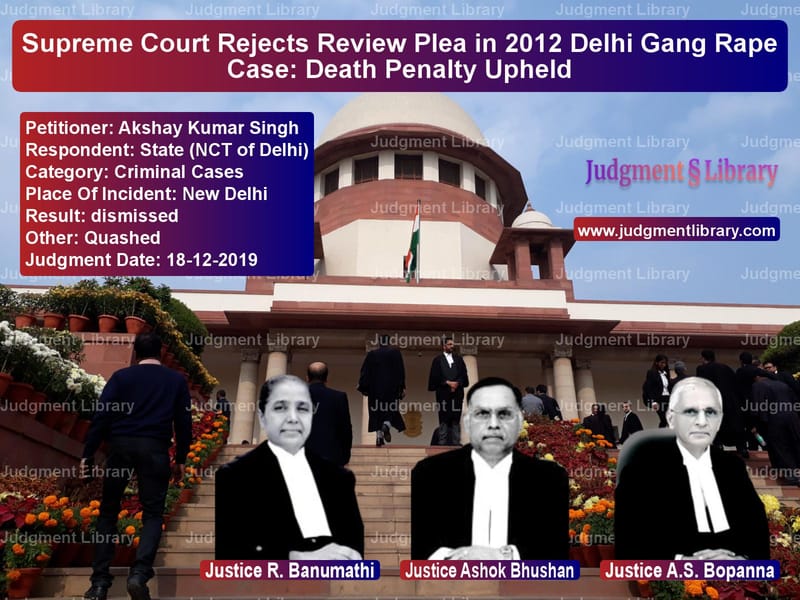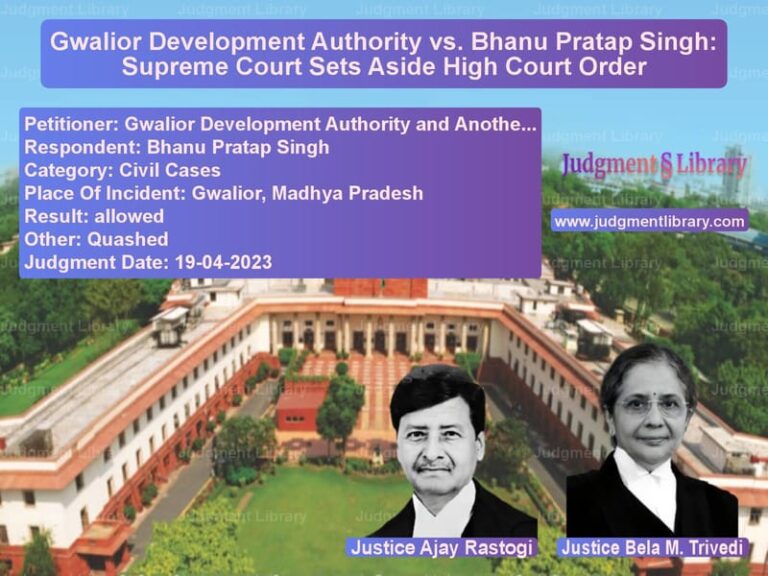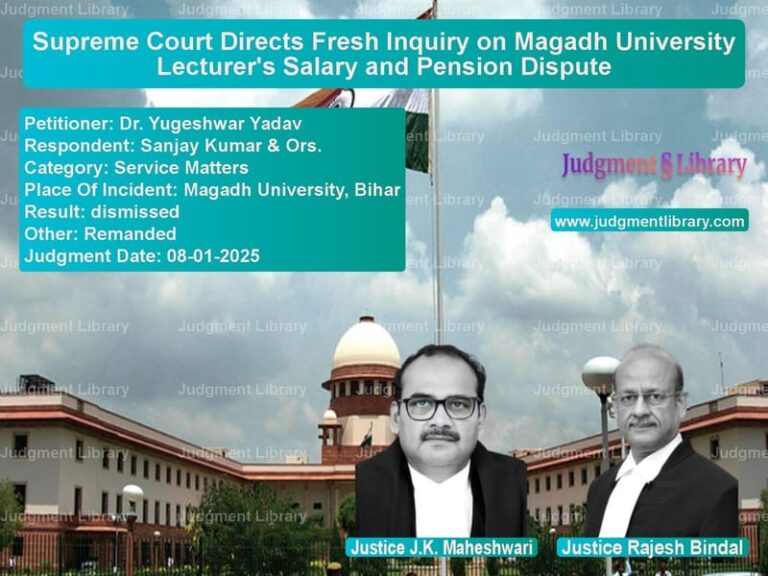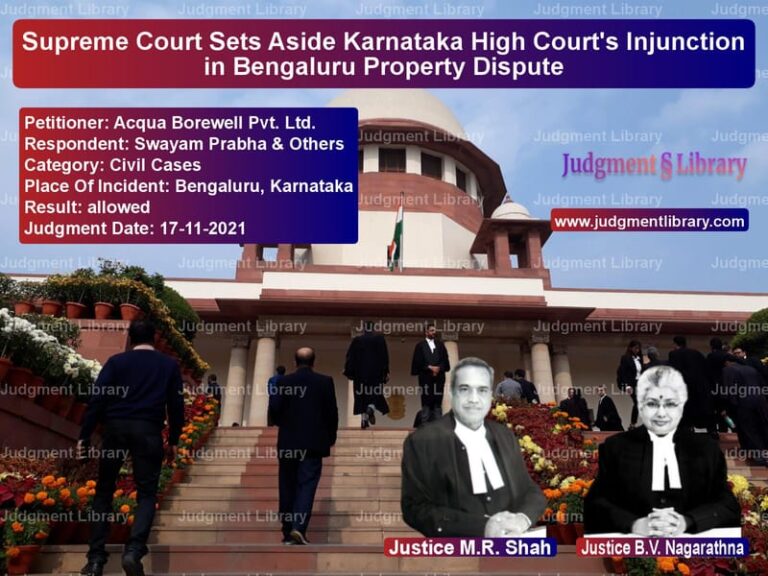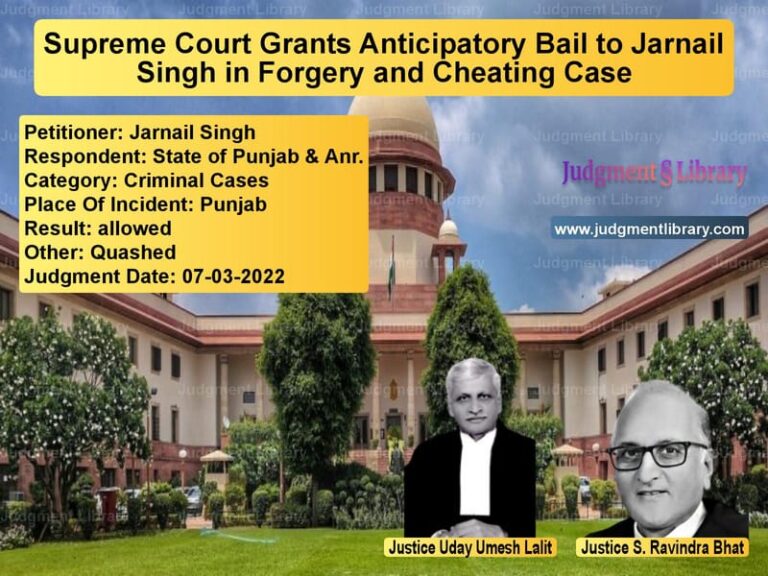Supreme Court Rejects Review Plea in 2012 Delhi Gang Rape Case: Death Penalty Upheld
The Supreme Court of India, in its judgment dated December 18, 2019, dismissed the review petition filed by Akshay Kumar Singh, one of the convicts in the 2012 Delhi gang rape and murder case. The Court reaffirmed its earlier decision upholding the death sentence for the accused, ruling that there was no error apparent on the face of the record that warranted a review.
Background of the Case
The horrific crime took place on the night of December 16, 2012, when the 23-year-old victim and her male companion boarded a private bus at Munirka in South Delhi. Inside the bus, the victim was brutally gang-raped, assaulted with an iron rod, and both were later thrown out of the moving vehicle in a semi-naked condition. The victim sustained severe internal injuries and was transferred to Mount Elizabeth Hospital in Singapore, where she succumbed to her injuries on December 29, 2012.
The trial court sentenced all the adult accused, including Akshay Kumar Singh, to death in 2013. The Delhi High Court affirmed the death penalty in 2014, and the Supreme Court upheld it on May 5, 2017. The convict then filed a review petition challenging the verdict.
Legal Issues Before the Supreme Court
- Whether the review petition raised any new substantial grounds.
- Whether the death sentence was justified under the “rarest of rare” doctrine.
- Whether there was any procedural lapse or error apparent on the face of the record.
- Whether mitigating circumstances justified reducing the sentence.
Arguments by the Petitioner (Akshay Kumar Singh)
- The petition challenged the death penalty on various grounds, including the argument that life expectancy in Delhi NCR was already reduced due to pollution.
- The convict contended that the imposition of the death penalty was arbitrary and unfair, violating fundamental rights.
- The plea reiterated that the evidence presented in the case was unreliable and that the accused was falsely implicated.
- It was argued that sentencing should consider social and economic factors, and the death penalty disproportionately affected individuals from poor backgrounds.
Arguments by the Respondent (State – NCT of Delhi)
- The prosecution contended that all legal avenues had already been exhausted and that the convict was attempting to delay execution.
- The evidence against the petitioner, including DNA samples, eyewitness testimony, and medical reports, was overwhelming.
- The gravity of the crime justified the imposition of the death penalty.
- The courts had already considered all mitigating factors, and there was no justification for reconsideration.
Supreme Court’s Judgment
The three-judge bench, comprising Justice R. Banumathi, Justice Ashok Bhushan, and Justice A.S. Bopanna, dismissed the review petition, reiterating that the crime fell under the “rarest of rare” category and warranted the death penalty.
The Court observed:
“A review of a judgment is a serious step and reluctant resort to it is proper only where a glaring omission or patent mistake or like grave error has crept in earlier by judicial fallibility. A mere repetition of old and overruled arguments, or minor mistakes of inconsequential import, are insufficient.”
On the question of mitigating factors, the Court held:
“The young age and socioeconomic background of the convicts cannot be taken as mitigating circumstances when the crime committed is of such an inhuman nature. The brutality of the act and the trauma inflicted on the victim justify the sentence imposed.”
The Court also rejected arguments regarding life expectancy and pollution, terming them as “frivolous” and “irrelevant.”
Key Takeaways from the Judgment
- The scope of review petitions in criminal cases is limited to errors apparent on the face of the record.
- The Court reaffirmed the applicability of the “rarest of rare” doctrine in cases of extreme brutality.
- Mitigating factors, such as socioeconomic conditions, do not hold weight when the crime involves exceptional depravity.
- The judgment reinforced that death penalty reviews cannot be used to indefinitely delay execution.
Final Decision
- The Supreme Court dismissed the review petition.
- The death penalty of the petitioner was reaffirmed.
- No further modifications were allowed in the judgment.
Implications of the Judgment
This ruling upholds the principle that heinous crimes must be met with proportionate punishment. It sends a strong message regarding justice for victims of sexual violence and reinforces judicial consistency in applying the death penalty in “rarest of rare” cases.
Petitioner Name: Akshay Kumar Singh.Respondent Name: State (NCT of Delhi).Judgment By: Justice R. Banumathi, Justice Ashok Bhushan, Justice A.S. Bopanna.Place Of Incident: New Delhi.Judgment Date: 18-12-2019.
Don’t miss out on the full details! Download the complete judgment in PDF format below and gain valuable insights instantly!
Download Judgment: Akshay Kumar Singh vs State (NCT of Delhi) Supreme Court of India Judgment Dated 18-12-2019.pdf
Direct Downlaod Judgment: Direct downlaod this Judgment
See all petitions in Rape Cases
See all petitions in Bail and Anticipatory Bail
See all petitions in Custodial Deaths and Police Misconduct
See all petitions in Judgment by R. Banumathi
See all petitions in Judgment by Ashok Bhushan
See all petitions in Judgment by A. S. Bopanna
See all petitions in dismissed
See all petitions in Quashed
See all petitions in supreme court of India judgments December 2019
See all petitions in 2019 judgments
See all posts in Criminal Cases Category
See all allowed petitions in Criminal Cases Category
See all Dismissed petitions in Criminal Cases Category
See all partially allowed petitions in Criminal Cases Category

